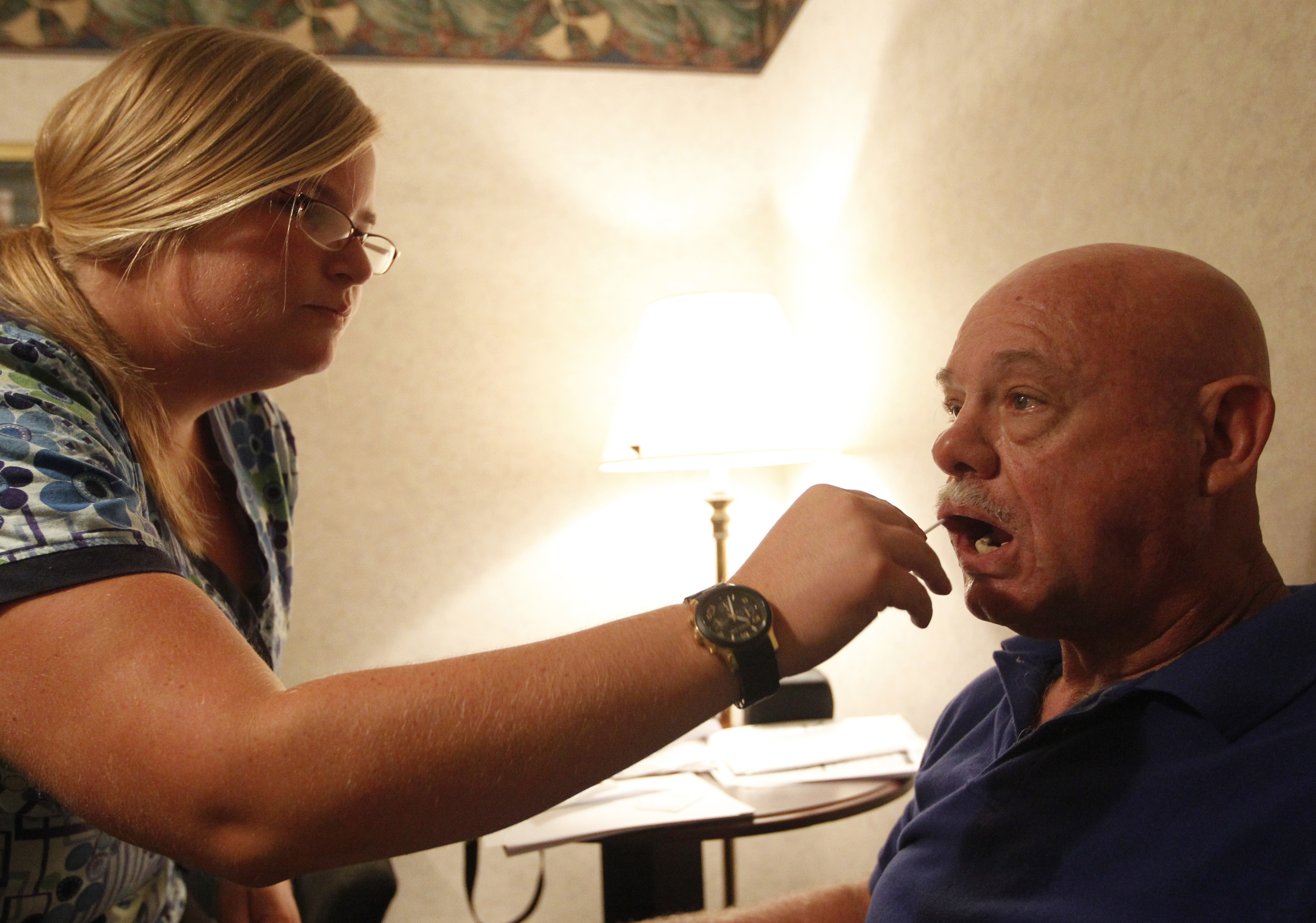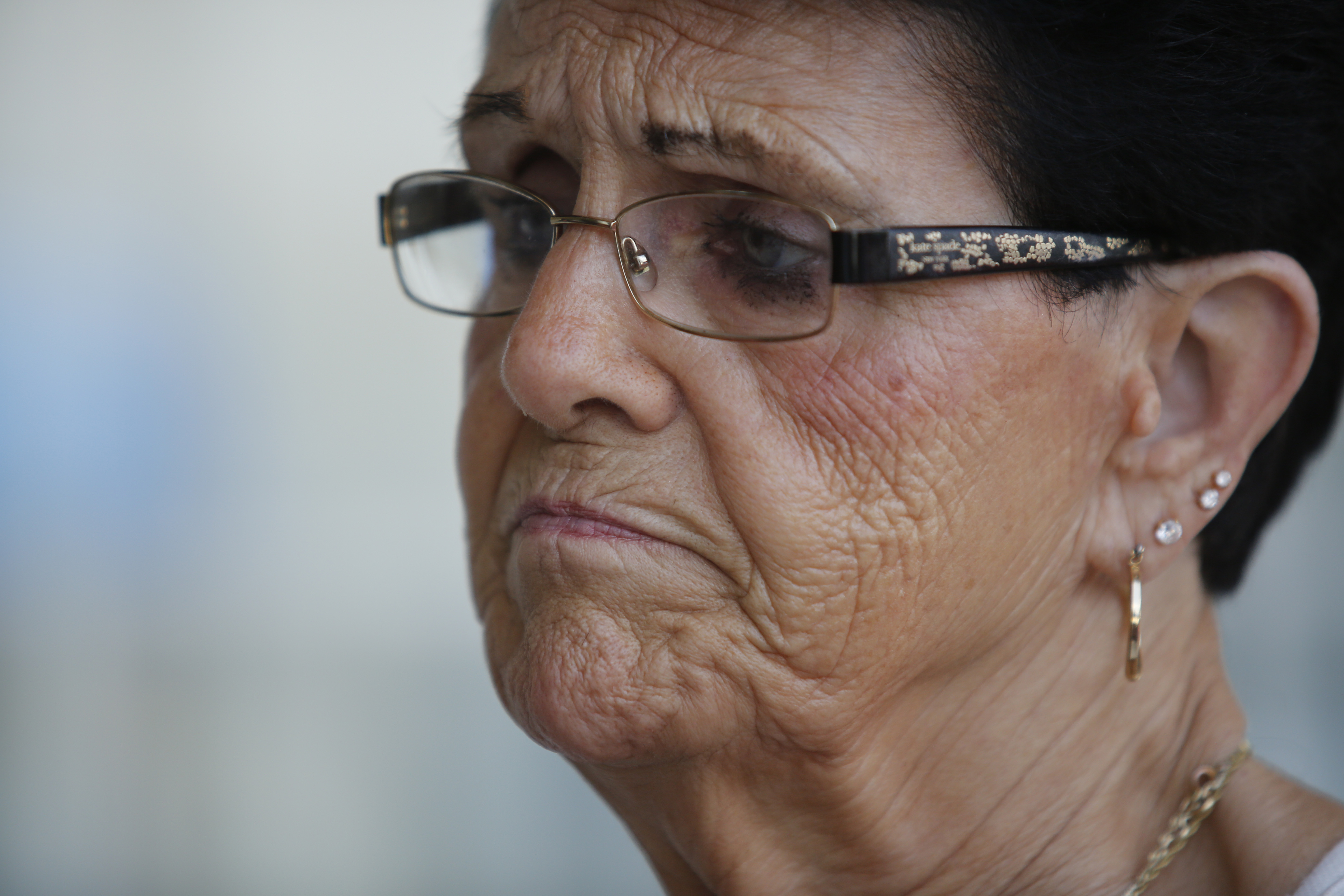Seeking family links: Hicks babies hope DNA will uncover histories
As of Monday, March 13, 2023
 Nurse Taylor Walker swabs the cheek of Hixson, Tenn., resident and "Hicks baby" Paul Payne to take a DNA sample. Men and women who were sold in off-the-record adoptions by Dr. Thomas Hicks in his McCaysville, Ga., clinic in the 1950s and '60s gathered at the inn to submit DNA samples in hopes of finding siblings or parents.
Nurse Taylor Walker swabs the cheek of Hixson, Tenn., resident and "Hicks baby" Paul Payne to take a DNA sample. Men and women who were sold in off-the-record adoptions by Dr. Thomas Hicks in his McCaysville, Ga., clinic in the 1950s and '60s gathered at the inn to submit DNA samples in hopes of finding siblings or parents. Mary Ann Guest, 75, who believes one of her daughters may be a "Hicks baby," speaks Saturday on the porch of the Ocoee River Inn in Ducktown, Tenn., after submitting a DNA sample. Guest said she believes Dr. Thomas Hicks, who sold infants in off-the-record adoptions in his McCaysville, Ga., clinic in the 1950s and '60s, secretly handed her daughter Debra to another family after claiming that she had died of jaundice.
Mary Ann Guest, 75, who believes one of her daughters may be a "Hicks baby," speaks Saturday on the porch of the Ocoee River Inn in Ducktown, Tenn., after submitting a DNA sample. Guest said she believes Dr. Thomas Hicks, who sold infants in off-the-record adoptions in his McCaysville, Ga., clinic in the 1950s and '60s, secretly handed her daughter Debra to another family after claiming that she had died of jaundice.How to helpIf you think you might be a Hicks baby or a relative of a Hicks baby, please contact adoptee Paul Payne in Hixson at 423-637-2617 or adoptee Melinda Elkins Dawson in Ohio at 937-248-4712.
DUCKTOWN, Tenn. - They hoped she would read about it in the newspaper, and that wherever she was - tucked away in a quiet suburb with family or spending her final days in a nursing home - she would come to them.
They hoped a prick of conscience would end years of silence and mystery, that they would find familiar eyes, roots, not far from where they entered the world and left in the arms of strangers.
So around seven men and women, sold as newborns decades ago by North Georgia doctor Thomas Hicks to families desperate for children, returned Saturday to the sleepy town 70 miles east of Chattanooga in search of their biological families.
When this group of "Hicks babies" announced they would be returning to Ducktown to collect DNA from locals in hopes of tracing their blood roots and medical histories, they didn't know what the response would be.
It had been almost 20 years since the news of the Hicks' black-market adoptions hit the media; almost 20 years since the National Enquirer, The New York Times and the TV news show "20/20" became consumed with the story of the town with a dark and well-hidden past; almost 20 years since it was discovered that more than 200 newborns were shuffled out of Hicks' clinic in the 1950s and 1960s, sold to strangers for anywhere from $100 to $1,000 apiece.
Hicks died in 1972 and so have all who worked with him. By now the birth mothers and fathers are also likely gone or close to it, in their 80s or 90s, their secrets dying with them.
Saturday could be the group's last chance to find genetic links.
At 10 a.m., when a line began forming outside a hotel room at the Ocoee River Inn where the samples were being taken, many of the adoptees were elated, relieved. Some of the older people who came to donate a cheek swab were quiet and talked to no one. Others greeted the crowd like family.
Mary Ann Guest, 75, never gave a child to Hicks for adoption, but said she believes one was taken from her. It was her third child, and she had traveled from Polk County to have Hicks deliver the child, a girl she called Debra.
When she arrived, she said, Hicks told her she didn't need to have so many children. But she assured him she wanted the new baby and that she loved all her babies. One day, she told him, she hoped to have six.
After the birth she remembers the baby being sent out of the room. Hicks told her the child had jaundice. Then she remembers being locked in, jiggling the door handle and hearing the sounds of a man and woman passing by, laughing and talking.
Later, Hicks would tell her that the baby died, but she never believed it. When his under-the-table operation was revealed years later, she became more convinced that her daughter was sent across state lines for a price.
"My baby went out that back door," she said in the parking lot of the Ducktown hotel. "I'll never believe nothing else."
By giving DNA Saturday, she hopes to find that daughter among the Hicks babies.
Randy Truelove traveled from Cleveland, Tenn., to give his DNA and told a similar story.
Truelove was one of seven children who grew up hand-to-mouth in Bradley County. For years Hicks was the family doctor, and he believes Hicks sold one of his siblings after telling his mother that the baby was stillborn.
He isn't the only person who can tell stories of the jarred fetuses Hicks kept in his clinic, and he believed Hicks preserved the dead fetuses to convince certain women that their children had died so he could sell them.
"He preyed on the poor, the poor he didn't think could afford another baby," he said, while trading stories with others clustered under the hotel awning. "I'm so excited, though. It would be something to find her."
For hours the locals and the adoptees talked. They took pictures together.
"Those cheekbones," one woman said to an adoptee. "You could be one of us."
Some brought old newspaper and magazine clippings from the '90s when the story of the Hicks babies first broke. A few flipped through an aged hotel registry from Copperhill, a place where they believe Hicks kept the girls about to give birth. When they found his name in ink, they acted as if they had found treasure.
A man walked up whom nobody knew, a local, and everyone began to whisper. From behind the screen he gave DNA and they could hear him talk.
"I know my parents ain't my parents," he told the nurse. "But everyone took it to their grave."
Cyndy Stapleton, a Hicks adoptee who traveled from Ohio, told the story of finding her birth mother and showed pictures. In the '90s, when the Hicks babies were all over the news, a woman came forward and said she gave up a daughter to Hicks and wanted to find her. A DNA match linked the woman to Stapleton.
"She had had an abortion in the '60s, and her husband told her to have another one," Stapleton said. "Dr. Hicks talked her into keeping it."
In the years since they found each other the two lost touch, but Stapleton said she is glad to know the truth. She hopes to find more relatives through genetic testing.
By 2 p.m. more than 30 samples had been collected and the rain began to pour. Everyone considered the day a success.
Even though they were sold out of a back door, most of the adoptees say they aren't angry and they aren't looking for anyone to blame. Even Hicks was a complex character. He was a liar, but he was beloved for keeping the secrets of desperate women and giving childless couples the children they dreamed of having.
Diane Conrad, who was adopted by an Ohio couple in 1957, said her mother was 50 when they came to Hicks for a baby. They heard about him from a baby broker among the rubber workers. Conrad said the woman who adopted her was too old and too poor to go through a legal adoption process.
"My mom liked him," she said. "She thought he was a great man."
Contact Joan McClane at jmcclane@timesfreepress.com or 423-757-6601.
